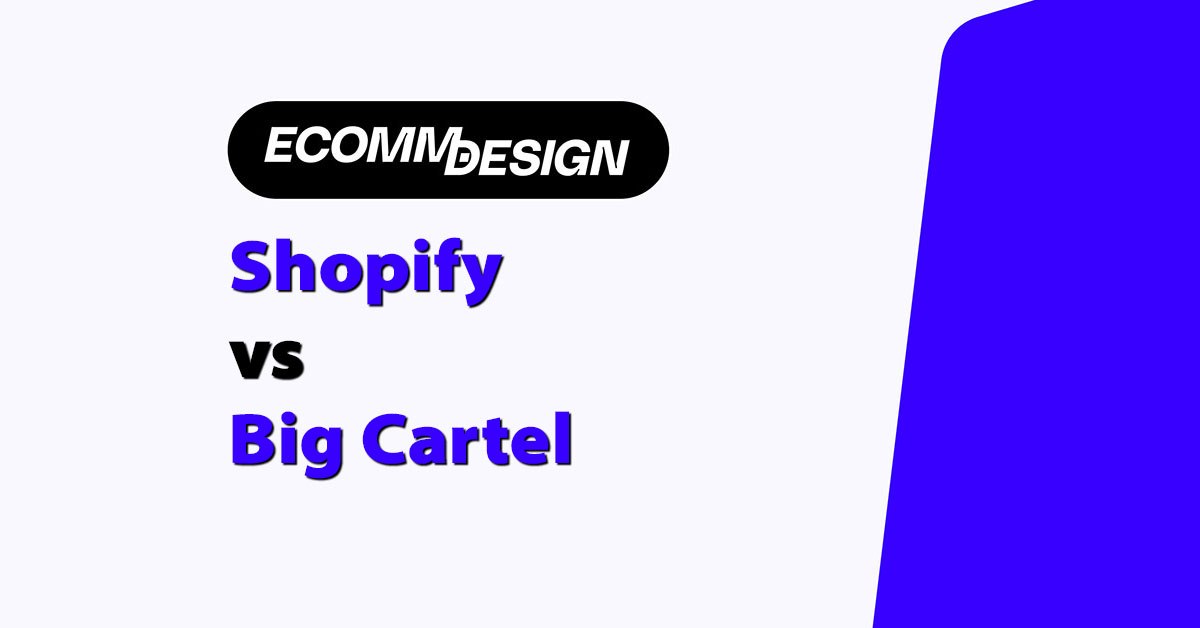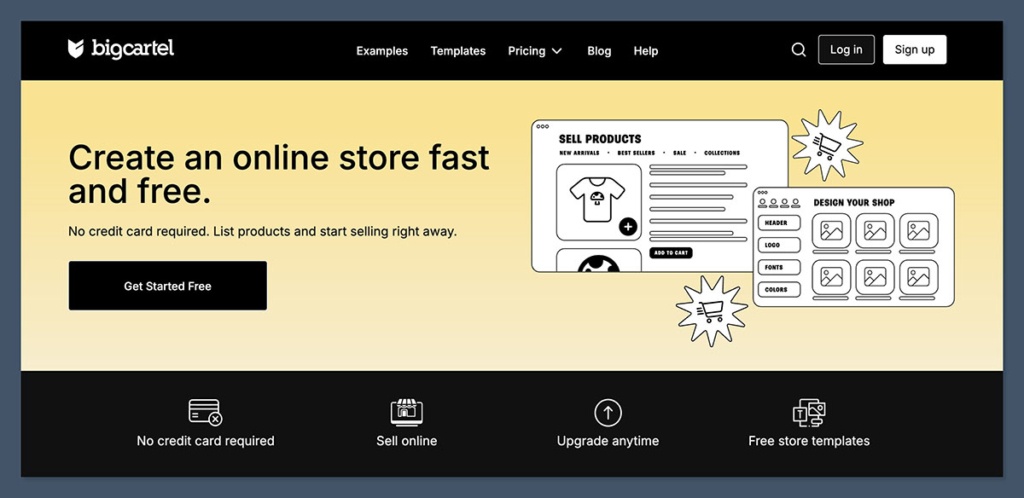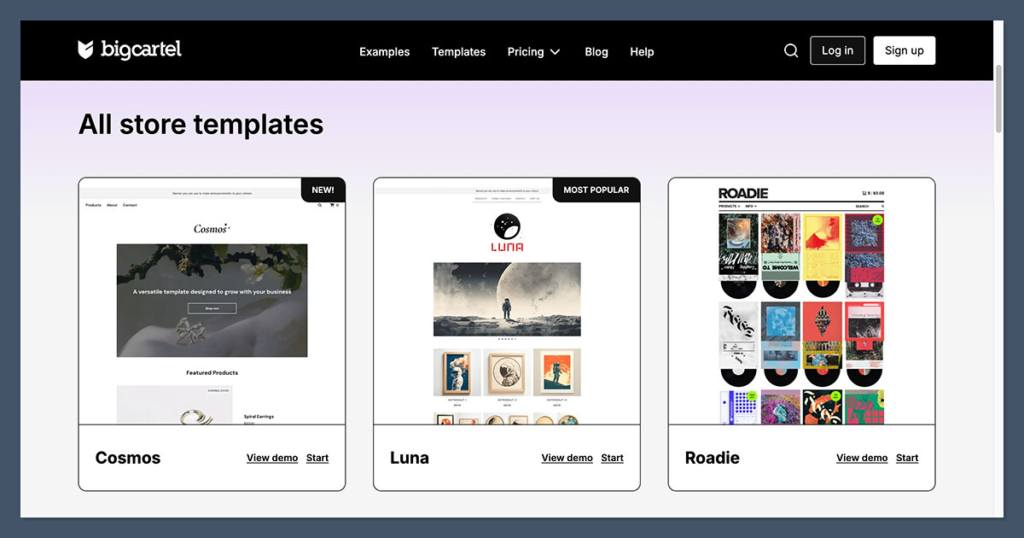
Picking the right ecommerce platform isn’t just about shiny templates or low fees — it’s about what actually helps you sell and grow.
I’ve personally tested both Shopify and Big Cartel across multiple projects. If you’re weighing up which one’s right for your business — especially if you’re in the ecommerce or ecommerce design space — this is the no-BS breakdown you need.
TL;DR:
Shopify is better for growth, SEO, and serious selling.
Big Cartel is cheaper, cleaner, and simpler — great for artists or side-hustlers.
Let’s break it down.
Shopify vs Big Cartel: My Quick Verdict
Big Cartel might be affordable and user-friendly, but Shopify is still the better option “overall” in my opinion.
Shopify gives you access to more advanced inventory management and sales tools, marketing and SEO features, and business management capabilities.
It’s also a lot more scalable, with omnichannel selling features, and thousands of integrations with popular apps.
Big Cartel, designed with artists and creators in mind, might be a good option for companies selling handmade goods, artwork, and creative services.
However, once you start to scale your business, you might want to consider switching to an alternative platform.
Shopify Pros and Cons
Pros
- Powerful website design tools and themes
- Intuitive AI-powered features for marketing and content creation
- Extensive range of app integrations
- Scalable plans for growing businesses
- Advanced omnichannel selling capabilities
- Stronger inventory management features
Cons
- Higher monthly fees
- Slightly more complex for beginners
- Additional transaction fees for third-party payment gateways.
Big Cartel Pros and Cons
Pros
- Straightforward and affordable tools for beginners.
- Access to a range of free templates for website design
- Excellent customer support
- Valuable self-help resources for artists and creators
- No transaction fees
Cons
- Limited sales tools
- Basic marketing capabilities
- Limitations on how many products you can sell
Pricing: Big Cartel Wins on Cost, Shopify Wins on Value
When you’re just getting started, budget is one of the first deal-breakers. I’ve worked with plenty of sellers who want to minimise spend upfront — but also want the flexibility to grow.
That’s where Shopify and Big Cartel feel like total opposites.
Here’s how the pricing stacks up:
| Plan Tier | Shopify | Big Cartel |
|---|---|---|
| Entry Plan | $5/month (Starter) | Free (up to 5 products) |
| Basic Plan | $39/month | $15/month (Platinum – 50 items) |
| Mid Tier | $105/month | $30/month (Diamond – 500 items) |
| Free Trial | 3 days | 15 days |
| Transaction Fees | 2.9% + 30¢ (3rd-party) | 0% fees across all plans |
My Experience:
Big Cartel feels like a dream if you’re a creator just listing a few items. That free plan alone gets you live with:
- Product listings (up to 5)
- Mobile-friendly templates
- Basic SEO setup
- No transaction fees

But once you’re ready to do more — say you want product variants, sales analytics, or better shipping rules — you’ll run into limitations fast. Their paid plans are still affordable, but product limits (50 and 500 max) can be restrictive.
Shopify, on the other hand, looks expensive at first glance. But it gives you:
- Unlimited products from day one
- Tools like abandoned cart emails, discount rules, and multichannel integrations
- Scalable plans for every growth stage

Even that $5/month Starter plan lets you sell on social platforms like Instagram and Facebook, which is more than Big Cartel’s free plan can offer.
Verdict:
- Use Big Cartel if you’re selling <50 items, want to avoid fees, and don’t need deep features.
- Go with Shopify if you’re in this to build a real business and scale over time.
There’s also an enterprise-tier plan (Starting at $2,300 per month), and a Starter plan ($5 per month) for social media selling.
Shopify does charge transaction fees if you’re using a third-party payment processor, but you can bypass these costs by using Shopify Payments.
Shopify vs Big Cartel: The Core Features
Since they’re both ecommerce platforms, Shopify and Big Cartel do offer a lot of overlapping features for online selling, marketing, and business management.
For the most part though, Shopify’s features are a lot more advanced.
Let’s take a closer look at the key features of both tools.
Design + Customisation: Shopify Gives You Control, Big Cartel Keeps It Simple
Design matters, and both platforms give you starter templates to work with. Big Cartel is ideal for clean, visual stores — think artists or photographers — but it offers minimal design flexibility unless you’re editing code.

Shopify, on the other hand, gives you a drag-and-drop builder, advanced theme customisation, and access to over 100 premium templates. Whether it’s mega menus, product tabs, or homepage sliders — you’re in control.
Design Comparison:
| Feature | Shopify | Big Cartel |
|---|---|---|
| Free Themes | 13 | 17 |
| Paid Themes | 100+ ($100–$500) | None |
| Design Editor | Drag-and-drop + HTML/CSS | Basic styling + HTML |
| Advanced Layouts | Yes (via Liquid) | Limited |
Verdict:
- Big Cartel is quick and simple, ideal for minimalist stores.
- Shopify is built for brands that want full design control and flexibility.
Sales Features: Shopify Has Everything, Big Cartel Covers the Basics
Shopify shines when it comes to actual selling. It supports unlimited products, real-time shipping rates, POS systems, and native dropshipping integrations. It also lets you set up advanced discount rules and product bundles.
Big Cartel is fine for basic product listings, coupon codes, and manual order handling. But there’s no real automation, no advanced inventory tools, and very limited scalability.
Sales Feature Comparison:
| Feature | Shopify | Big Cartel |
|---|---|---|
| Inventory Limits | Unlimited | 5–500 |
| POS | Native Shopify POS | 3rd-party only |
| Abandoned Cart Email | Yes (all paid plans) | Paid plans only |
| Shipping | Real-time rates + discounts | Manual setup only |
| Variants/Options | Unlimited | Limited |
Verdict:
Big Cartel is okay if you’re handling everything manually with a small inventory.
Shopify is built to help you scale and automate.
SEO + Marketing: Shopify Gives You Tools to Grow, Big Cartel Just Keeps You Live
Marketing and SEO are critical if you’re not relying 100% on social or direct traffic. Shopify offers a built-in blog, SEO apps, multichannel integrations, and tools like Shopify Email or Semrush-powered Ecommerce Booster.
Big Cartel covers only the basics: meta titles, descriptions, and basic image alt text. There’s no blog, no structured data, and no native tools for reviews or social selling.
SEO & Marketing Comparison:
| Feature | Shopify | Big Cartel |
|---|---|---|
| Blog | Yes | No |
| Email Marketing | Native + integrations | Zapier only |
| SEO Apps | Yes | No |
| Multichannel Selling | Yes (TikTok, Amazon, FB) | Manual only |
| Structured Data | Basic Schema | None |
Verdict:
- Shopify helps you grow traffic and brand reach long-term.
- Big Cartel is good for simple stores relying on existing traffic.
App Market + Integrations: Shopify’s Universe vs Big Cartel’s Toolkit
Apps add power. Shopify has 8,000+ integrations covering everything from SEO and loyalty programs to subscriptions and analytics. You can build anything you need — no code required.
Big Cartel has limited integrations, mostly through Zapier. If you need print-on-demand or email marketing, it’s doable — but not seamless.
App Comparison:
| Category | Shopify (8,000+ apps) | Big Cartel (Limited) |
|---|---|---|
| SEO & Analytics | Yes | Basic (Google Analytics) |
| Print-on-Demand | Yes (Printful, Gelato) | Some via plugin |
| Email/SMS | Klaviyo, Omnisend | Zapier only |
| Social Integrations | Native | Manual |
| API Access | Full | Very limited |
Verdict:
- Use Shopify if you want to expand with apps and automation.
- Use Big Cartel if you’re fine keeping it manual and minimal.
Support and Ease of Use: Big Cartel is Simple, Shopify is Smoother
Both platforms are easy to use — but in very different ways. Big Cartel is great if you just want to get online fast with no friction. It’s simple, minimal, and distraction-free.
Shopify takes a bit longer to learn, but it walks you through setup with guided steps, offers built-in AI help, and gives you 24/7 live chat support. Once you’re familiar with the dashboard, managing everything becomes fast and efficient.
Ease of Use Comparison:
| Feature | Shopify | Big Cartel |
|---|---|---|
| Onboarding | Guided, smart setup | Simple and fast |
| Dashboard | Clean + full-featured | Minimal, basic |
| Customer Support | 24/7 chat + Help Centre | Email (weekdays only) |
| Tutorials | Shopify Academy | Basic help docs |
Verdict:
- Big Cartel is great for getting online fast with minimal setup.
- Shopify is better for long-term support and smoother scaling.
Who Should Actually Use Shopify?
Shopify is for serious ecommerce sellers who:
- Want to scale with SEO, content, and automation
- Sell more than 50 products
- Want multichannel selling (e.g. TikTok, Amazon, Etsy)
- Need advanced inventory, shipping, or payments
- Care about conversion rate, site speed, and templates
It’s the right choice if you want your store to be the core of your brand.
Shopify vs Big Cartel: Final Verdict
If I had to boil it down:
- Big Cartel is simple, clean, and good for creative micro-businesses.
- Shopify is powerful, scalable, and built to help you grow.
Personally? I’ve launched client stores on both. Every time someone wants to actually grow — Shopify’s the one we switch to.
Start with Big Cartel if budget and simplicity are your top priorities. But the moment you hit limits or want more SEO traction, Shopify’s waiting.



